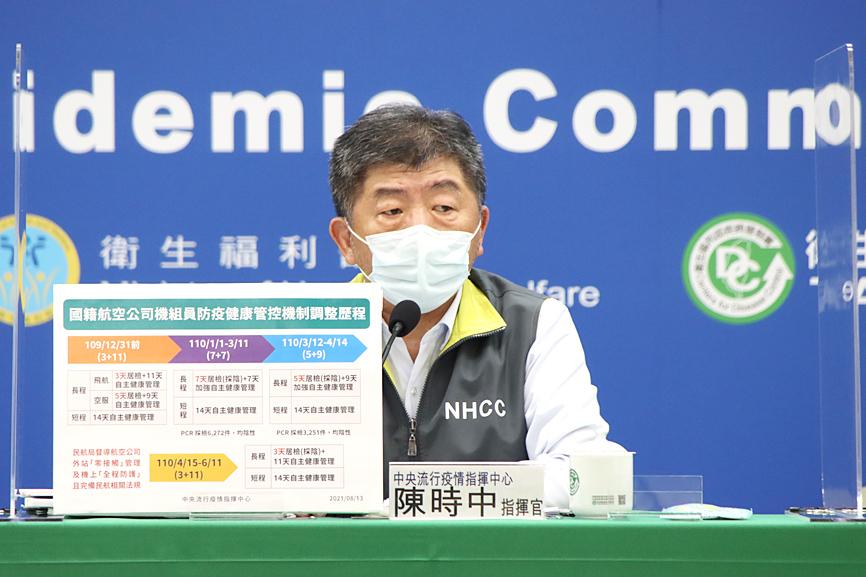A COVID-19 outbreak that started in May was unrelated to the relaxation of quarantine rules for aircrew members in April, Minister of Health and Welfare Chen Shih-chung (陳時中) said yesterday.
The Central Epidemic Command Center (CECC), which is headed by Chen, on April 15 allowed crew members on long-haul flights to isolate for just three days after their return. After testing negative for COVID-19, they were required to monitor their health for 11 days.
The relaxed rules, dubbed “three-plus-11,” have been criticized as many believe they led to the COVID-19 outbreak, prompting the CECC to imposed a nationwide level 3 pandemic alert from May 19 until July 27.

Photo courtesy of the Central Epidemic Command Center
Asked whether a planned resumption of quarantine-free travel between Taiwan and Palau might lead to another surge in infections, Chen on Thursday denied that the outbreak was related to the relaxed aircrew rules.
“There was no three-plus-11 loophole,” Chen said.
Cluster infections among China Airlines Ltd (中華航空) crew members and Novotel Taipei Taoyuan International Airport hotel employees did not spread to local communities, Chen said, adding that the cluster started with the infection of a China Airlines pilot who tested positive in Australia.
A version of the three-plus-11 policy without mandatory testing was in place last year, before being updated to a “seven-plus-seven” policy on Jan. 1, Chen said yesterday.
From March 12 to April 14, the center imposed a “five-plus-nine” policy, which was on April 15 updated to the three-plus-11 policy with additional measures to curb the spread of COVID-19 on planes, he said.
Since June 14, aircrew members returning from high-risk countries are required to quarantine for 14 days.
Chen said the adjustments were made according to the COVID-19 situations at the time.
A three-month investigation led by the CECC did not find a connection between the air crew cluster and the outbreak in May, he said.
Chen’s remarks were met with criticism online, with commenters urging him to take responsibility for Taiwan’s about 800 deaths due to COVID-19 since May.
In May, Chinese-language weekly magazine Mirror Media leaked a voice recording of an April 1 meeting about the the nation’s disease prevention measures in which Democratic Progressive Party Legislator Fan Yun (范雲) allegedly recommended the adoption of the three-plus-11 rule for aircrew members.
Yesterday, Fan said that she would cooperate should there be an investigation into the process that led to the relaxed rules.
Separately yesterday, Chinese Nationalist Party (KMT) caucus convener Alex Fai (費鴻泰), caucus secretary-general Jessica Chen (陳玉珍) and caucus deputy secretary-general Wan Mei-ling (萬美玲) said that Chen’s refusal to acknowledge that the rule change led to the May outbreak was “beyond shameless.”
The KMT caucus said that it would take Chen to court and report him to the Control Yuan.
Additional reporting by Chen Yun and CNA

NATIONAL SECURITY THREAT: An official said that Guan Guan’s comments had gone beyond the threshold of free speech, as she advocated for the destruction of the ROC China-born media influencer Guan Guan’s (關關) residency permit has been revoked for repeatedly posting pro-China content that threatens national security, the National Immigration Agency said yesterday. Guan Guan has said many controversial things in her videos posted to Douyin (抖音), including “the red flag will soon be painted all over Taiwan” and “Taiwan is an inseparable part of China,” while expressing hope for expedited “reunification.” The agency received multiple reports alleging that Guan Guan had advocated for armed reunification last year. After investigating, the agency last month issued a notice requiring her to appear and account for her actions. Guan Guan appeared as required,

Japan and the Philippines yesterday signed a defense pact that would allow the tax-free provision of ammunition, fuel, food and other necessities when their forces stage joint training to boost deterrence against China’s growing aggression in the region and to bolster their preparation for natural disasters. Japan has faced increasing political, trade and security tensions with China, which was angered by Japanese Prime Minister Sanae Takaichi’s remark that a Chinese attack on Taiwan would be a survival-threatening situation for Japan, triggering a military response. Japan and the Philippines have also had separate territorial conflicts with Beijing in the East and South China

A strong cold air mass is expected to arrive tonight, bringing a change in weather and a drop in temperature, the Central Weather Administration (CWA) said. The coldest time would be early on Thursday morning, with temperatures in some areas dipping as low as 8°C, it said. Daytime highs yesterday were 22°C to 24°C in northern and eastern Taiwan, and about 25°C to 28°C in the central and southern regions, it said. However, nighttime lows would dip to about 15°C to 16°C in central and northern Taiwan as well as the northeast, and 17°C to 19°C elsewhere, it said. Tropical Storm Nokaen, currently

PAPERS, PLEASE: The gang exploited the high value of the passports, selling them at inflated prices to Chinese buyers, who would treat them as ‘invisibility cloaks’ The Yilan District Court has handed four members of a syndicate prison terms ranging from one year and two months to two years and two months for their involvement in a scheme to purchase Taiwanese passports and resell them abroad at a massive markup. A Chinese human smuggling syndicate purchased Taiwanese passports through local criminal networks, exploiting the passports’ visa-free travel privileges to turn a profit of more than 20 times the original price, the court said. Such criminal organizations enable people to impersonate Taiwanese when entering and exiting Taiwan and other countries, undermining social order and the credibility of the nation’s